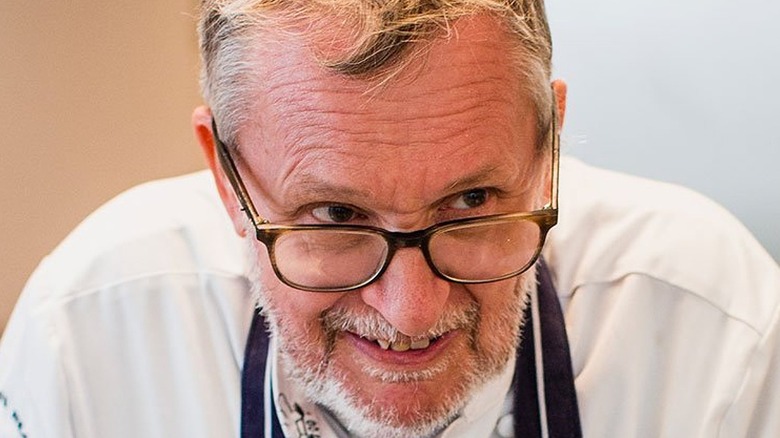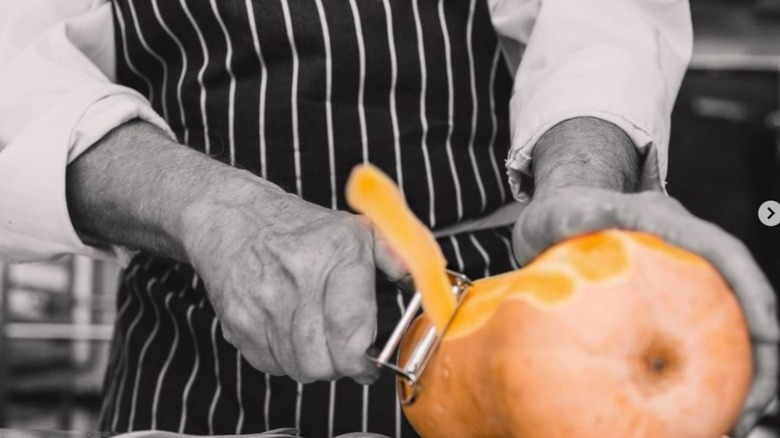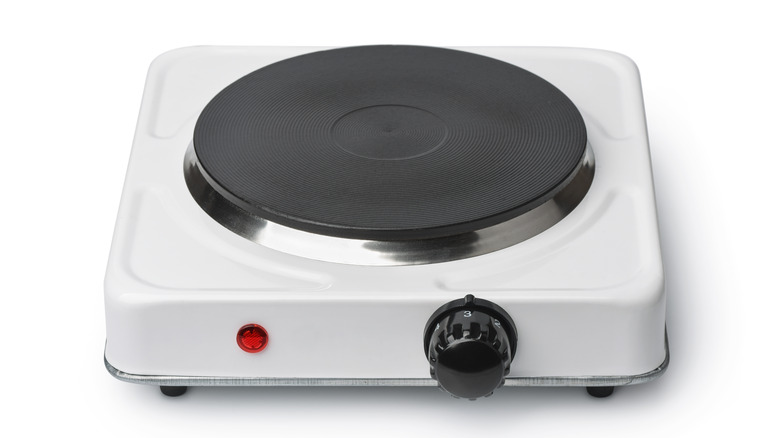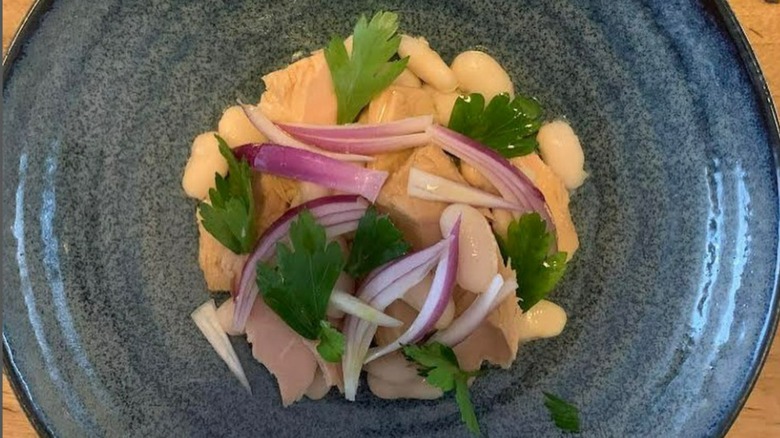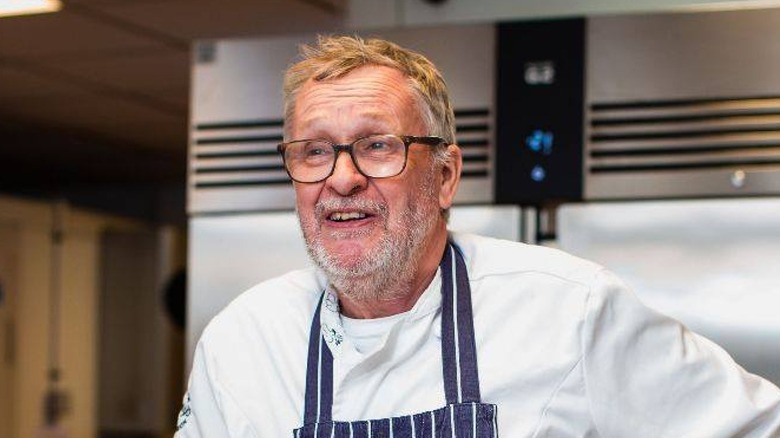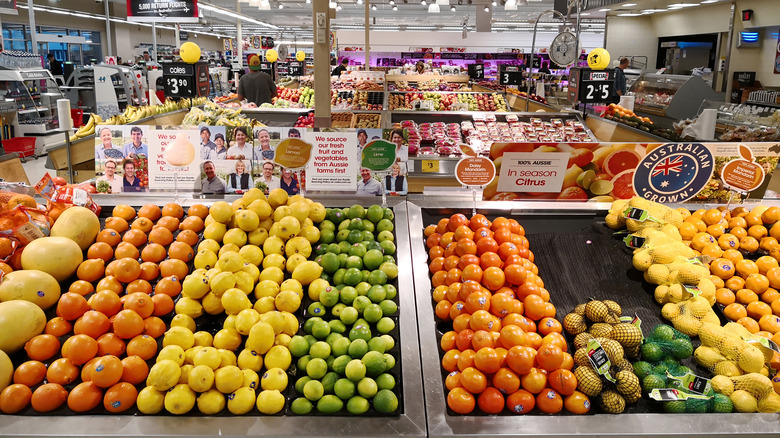The Untold Truth Of Alastair Little
"Chef, restaurateur, and cookbook author Alastair Little has died at 72," Eater London reported on Wednesday, August 3, 2022. "Deeply saddened to learn that the great chef Alastair Little died last night," wrote Australian celebrity chef Dan Lepard in a series of tweets that were liked and retweeted by many, including British celebrity chef Nigella Lawson, whose heartfelt words left the Twitterverse feeling emotional. Lepard's tweets recounted Little's influence on his own career in food as well as a meaningful screenshot of a previously unpublished quote from a long-ago first draft of Little's seminal 1993 book, "Keep it Simple." The first of five cookbooks Little authored introduced many in the world outside of London, England to the genre of food now known as "modern British cuisine" (via Eater). In fact, per The Sun, Alastair Little has been called the grandfather/godfather of this genre.
Contemporaneous reports of Little's death state neither a cause of death nor a location, as a silent monument to the paradoxically low profile that Alastair Little maintained throughout most of his enormously influential life (per Eater). Piecing the various reports together, however, it seems that Little was in either his home city of London or in his later-in-life-adopted city of Sydney and that he left behind two grown children from his first marriage to Kirsten Pederson, and a second wife, Sharon, who is also the mother of his third child, a son who is described as "young" (via The Sun).
Alastair Little is not a celebrity chef, per se
Alastair Little did not appear to court the limelight, even if he did end up achieving some measure of fame (per The Independent). Despite that he named his first restaurant after himself, London's Alastair Little, which opened in 1985, Little rose to fame almost exclusively on the basis of his formidable talents, skills, and passion for cooking (via Eater London). Moreover, his renown was, for the most part, built via word of mouth. To wit, Little didn't even turn up on television until 1990, when he made his first of what would be just a handful of appearances on "Master Chef," "Chef!," and "Food File" (per IMDb).
He didn't publish his first cookbook until 1993, and by 2002, he had sold his restaurants, including the trade name, Alastair Little, for some shocking reasons, per The Independent.
Alastair Little was not a celebrity chef. Rather, he would appear to fit into a category of chefs whom The New York Times refers to as a "chef's chef." In other words, Little directly influenced many other chefs with his exquisitely simple, eclectic, global cuisine as well as his minimalistic design aesthetic like bare tables and paper napkins. However, in so doing, he indirectly influenced both what we eat and how we eat it. He's also credited with "setting a new standard for London restaurants," according to The Drinks Business.
Alastair Little is a cooking autodidact
Alastair Little never went to cooking school, according to The Drinks Business. Rather, he taught himself to cook starting in childhood — but not with the intention of becoming a chef, or at least not that he was consciously aware. Rather, Little started teaching himself to cook while attending boarding school in Lancashire. Apparently, having come from a household that valued cooking and eating, he found the institutional food unacceptable (per Good Food), which describes how Little learned to make himself " toasted sandwiches and curries on a little gas ring in his dorm room."
Since cooking for himself seemed to be the only way he could enjoy a decent meal while at school, Little continued honing his cooking skills while an undergraduate at the prestigious University of Cambridge, where he was studying anthropology and archaeology. According to The Sun, he cooked his way through classic cookbooks such as "Mastering The Art Of French Cooking" by Julia Child.
When he graduated from Cambridge in 1972, he took a film editing job in Soho but supplemented his income working as a waiter and soon realized he wanted to "pursue hospitality full-time," per The Drinks Business. When the chef at the Old Compton Wine Bar, where Litte was working as a waiter, up and quit, Little asked for a shot and got it. In those early years, he continued learning to cook using Elizabeth David's "French Provincial Cooking."
Alastair Little cultivated a sophisticated palate from a very early age
Alastair Little's understanding and appreciation for food dates back to his childhood, during which he was regularly exposed to high-quality food at home and fine dining at restaurants throughout Europe (per Good Food). According to the outlet, "Little had been brought up by a family that enjoyed cooking and eating. His father, a naval officer, ate broadly and would always rise to the occasion when Little would push for something new. His mother was a great cook with a large vegetable garden at her disposal."
Moreover, during Little's childhood, while on school holidays, his parents took him along on with them on their travels throughout Europe. In fact, Little first became aware of his passion for fine foods and beverages while traveling in France with his family at age 11, according to The Drinks Business. Throughout his travels with his family, Little honed his sophisticated palate over such delicacies as gazpacho, coq au vin, and even "an unforgettable glass of Chateau d'Yquem," among others.
Alastair Little left the London restaurant world behind in 2003
After spending time learning the restaurant ropes at L'Escargot in the Soho neighborhood of London (1981) and 192 in Notting Hill (1983), Little opened his first restaurant on Frith Street in Soho. He called it "Alastair Little" not in service to his ego, but rather because his "uncompromising refusal to embellish" seemed to leave him with no other choice (per The Independent). In further service to Little's simplicity-driven ethos as a chef and restaurateur, the Alastair Little restaurant featured bare floors, bare tables (no tablecloths), and paper napkins, and its menu changed twice a day to reflect whatever fresh ingredients Little hoped to highlight at any given time.
Little's partner in the restaurant was also his life partner at the time. Little had married Kirsten Pederson in 1984, per The Sun. A year after opening the Soho location, Little and Pederson opened a second Alastair Little location in London, this one in West London. The two later divorced, leading to a lengthy dispute that ultimately forced Little to, in 2002, give up the rights to the restaurants bearing his name (via The Independent). By then, Little had already married his second wife, Sharon, an Australian woman who had been working in banking when the two met in 1995 in Umbria. In 2003, the couple opened a delicatessen/prepared foods/cafe in Notting Hill, according to Good Food. It remained open until its lease ran out (per Eater London).
Alastair Little had some choice words for the foodie scene in Australia
In April 2018, Good Food reported that Alastair Little and his second wife, Sharon, an Australian national, had moved with their young son from London to the Sydney, Australia suburb, Earlwood, where they opened a pop-up restaurant called Little Bistro. In addition, through the end of 2018, Little ran the kitchen at the Hotel CBD. A year later, the couple added a "home delivery service in London called By Alastair Little," to their portfolio (viaThe Sun).
However, it appears the couple remained in Sydney because in 2020, Good Food reported that Little had purchased a stake in the Potts Point restaurant, Et Al. What some Aussies found ironic about that development is that in the year prior, Little came under fire for taking shots at the quality of Australia's produce and declaring the Australian food scene a good 20 years behind that of London. "Some of Little's swipes at our produce were fair cop, others over the top," the Australian outlet noted before excusing Little's derision because it was "spurred on by criticism" of London. Moreover, Little swore he'd been quoted out of context. In fact, he clarified that he actually likes "plenty of Aussie produce," as well as Australian "cheese, truffles and brisket." Here's why farmers might be counting on Australia's avocados as supply chain chaos continues unchecked around the globe.
